- 123- 456-7890
- admin@youdomain.com
Menu
Institution
1. MATA KASTURBA MUSEUM
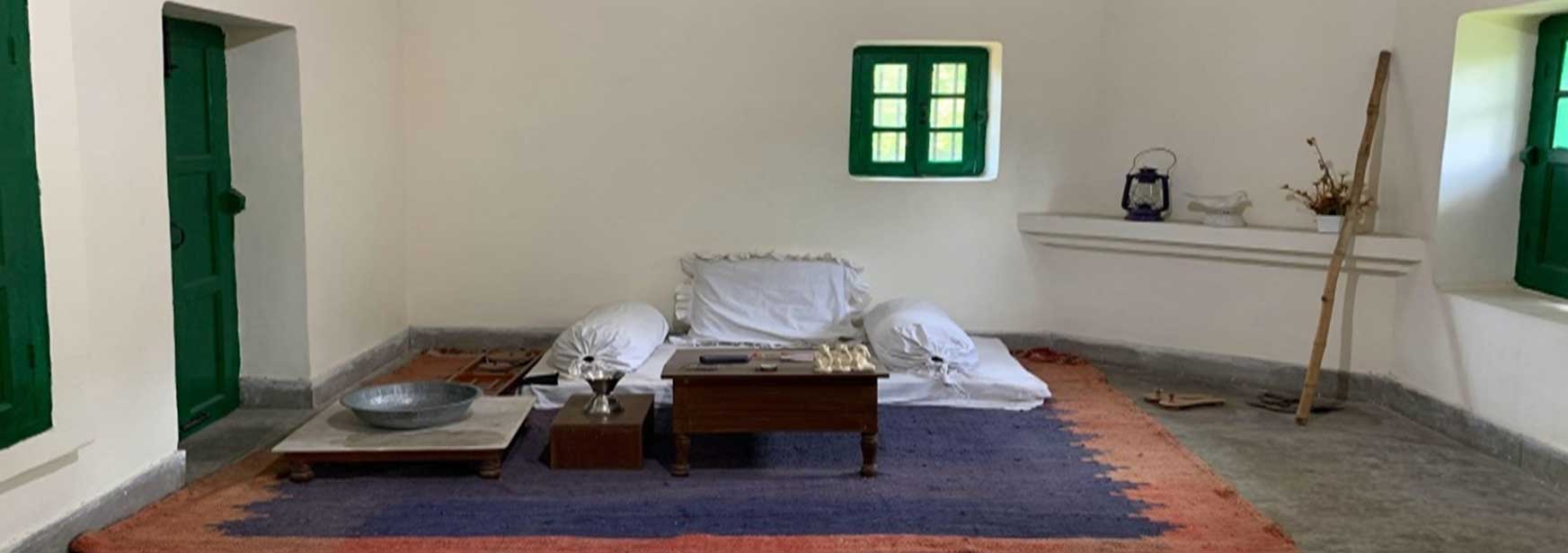
Kasturba Kutir also known as Mata Kasturba Memorial Museum is the house where Kasturba and her husband Mahatma Gandhi (Ba & Bapu) had lived in the Campus during their sojourn to Delhi in the 1930s & 1940s.The inauguration of the renovated Museum of Kasturba (a Museum on the life and activities of Ba ),at “Kasturba Kutir” Gandhi Ashram on 7th July 2017 by the Hon’ble Vice President of India,Shri Hamid Ansari, had been a stellar activity illuminating the image of Sangh, which had also the gracious presence of Ms Tara Gandhi Bhattacharya (grand-daughter of Mahatma Gandhi) and Prof. Sankar Kumar Sanyal, President of the Sangh.
It may be mentioned that Kasturba’s youngest son Devdas Gandhi and his wife along with their children, who were born here, also lived in this house. Ba used to stay most of the time with her grandchildren in this Kutir henceforth the house was named Kasturba Kutir in her memory. This house is situated in the 20-acre verdant green woodland known as Gandhi Ashram. It is a sacred and historical place. It holds the ownership of many rarest artefacts used by Gandhiji and Ba in their prominent lifetime such as the bathtub etc. and a replica of Bapu’s glasses, charkha, book stand, walking stick, spiritual beaded chandan mala, pocket watch etc. A gallery of Gandhiji’s images with eminent personalities who had visited him here for discussions during the freedom struggle has been created. It serves as a reminder of sacrifices made by individuals like Kasturba Gandhi and their enduring impact on the nation. One of the most compelling aspects of Kasturba Memorial Museum is its dedication to showcasing the role of women in India’s struggle for independence. The Museum is not just a historical repository but also an educational centre, offering insights into the Gandhian philosophy of truth, nonviolence and self-reliance. Visitors can gain a deeper understanding of the ideologies that guided both Kasturba and Mahatma Gandhi throughout their lives. In addition to the exhibits, the Museum hosts various educational programs, workshops, and lectures, making it an ideal destination for students, scholars, and anyone interested in India’s rich history and its quest for freedom. It serves as a reminder of the sacrifices made by individuals like Kasturba Gandhi and their enduring impact on the nation.
Visiting the Kasturba Memorial Museum offers a unique opportunity to connect with the spirit of a remarkable woman and the broader history of India’s struggle for independence. It is a place where history comes to life, inspiring visitors to continue the legacy of social justice, equality, and nonviolence championed by Kasturba and Mahatma Gandhi.
Ms. Hena Chakraborty, former Curator of Gandhi Smriti & Darshan Samity under Ministry of Culture, Govt. of India has taken spontaneous initiative to make it a full fledged first Museum on Kasturba, with her indomitable endeavour. She is trying her best to make it even more attractive in different ways. The Sangh appreciates Ms.Hena’s efforts to exhibit the lifestyle of Ba and Bapu at the museum and make it a historic place of learning for generations to come.
Contact: Hena Chakraborty: +919868001762; Email: hena.artist7gmail.com
2. THAKKAR BABA RESIDENTIAL PRIMARY SCHOOL & HOSTEL
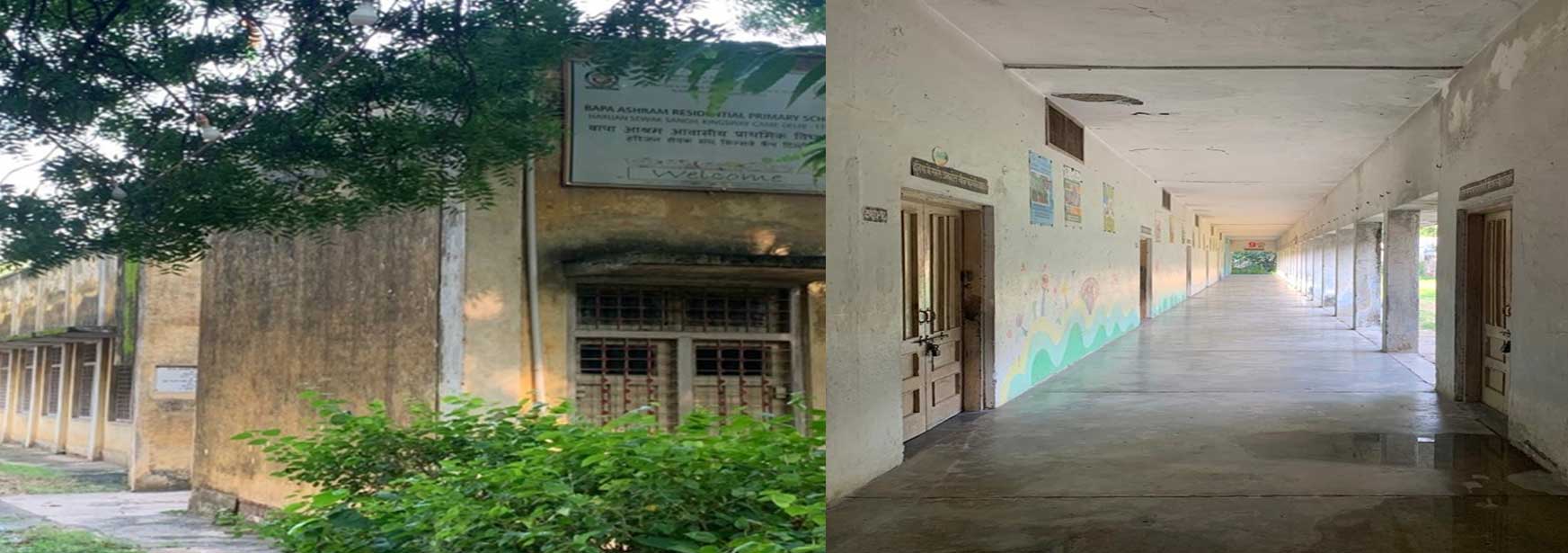
Bapa Ashram Residential Primary School is a prestigious educational institution catering to children from the Scheduled Caste community. It takes its name from Thakkar Bapa, a renowned social worker and a trusted confidant of Mahatma Gandhi. Our ultimate goal is to empower these children with knowledge, skills, and values that will enable them to lead dignified and productive lives.
We offer a comprehensive package that includes free schooling, accommodation, nutritious meals, clothing, and healthcare facilities. Since its establishment in 1966, this institution has received unwavering financial support from the Ministry of Social Justice and Empowerment, Government of India and North Delhi Municipal Corporation.
In addition to academic excellence, we also celebrate various festivals and events with our students such as celebrating Rakshabandhan with the President and Prime Minister of India, as well as visiting Raj Ghat, Gandhi Smriti & Darshan Samiti on Gandhi Jayanti and Martyrs Day, fostering a sense of community and cultural appreciation. This holistic approach to education ensures that our students receive a well-rounded experience that goes beyond the confines of the classroom.
The establishment of schools and hostels for the so-called untouchables was a crucial aspect of Mahatma Gandhi’s movement against untouchability. During that time, scavengers faced numerous challenges and barriers, living in unhygienic and impoverished colonies. In an effort to uplift their living conditions, Gandhiji envisioned schools and hostels in different locations for these underprivileged children. Thakkar Bapa Residential Primary School & Hostel, situated within the premises of Harijan Sevak Sangh in Delhi, is one such institution.
The School curriculum covers subjects such as Science, Social Science, English, Hindi, and Mathematics, spinning from 1st to 5th standard.After completing their fifth standard education,our girl students are seamlessly transferred to Kasturba Balika Vidyalaya in Ishwar Nagar, Okhla, New Delhi, where they continue their education up to the twelve standard. Additionally, we are proud to offer a well-equipped library for our student’s benefit.
In order to instil valuable skills, various activities are also conducted:
The students at this Residential Primary School display a strong interest in Yoga training and all students actively participate in various Yoga activities, Art and painting competition, Sports competition among students.Music training to students, Students’ excursions and educational tours are organised every year. On 19th December 2022 in Paramartha Niketan, Rishikesh where students participated in various competitions conducted by UNICEF. On 17th March 2024, students visited the Science Museum at Kurukshetra.
3. THAKKAR BAPA ASHRAM HOSTEL
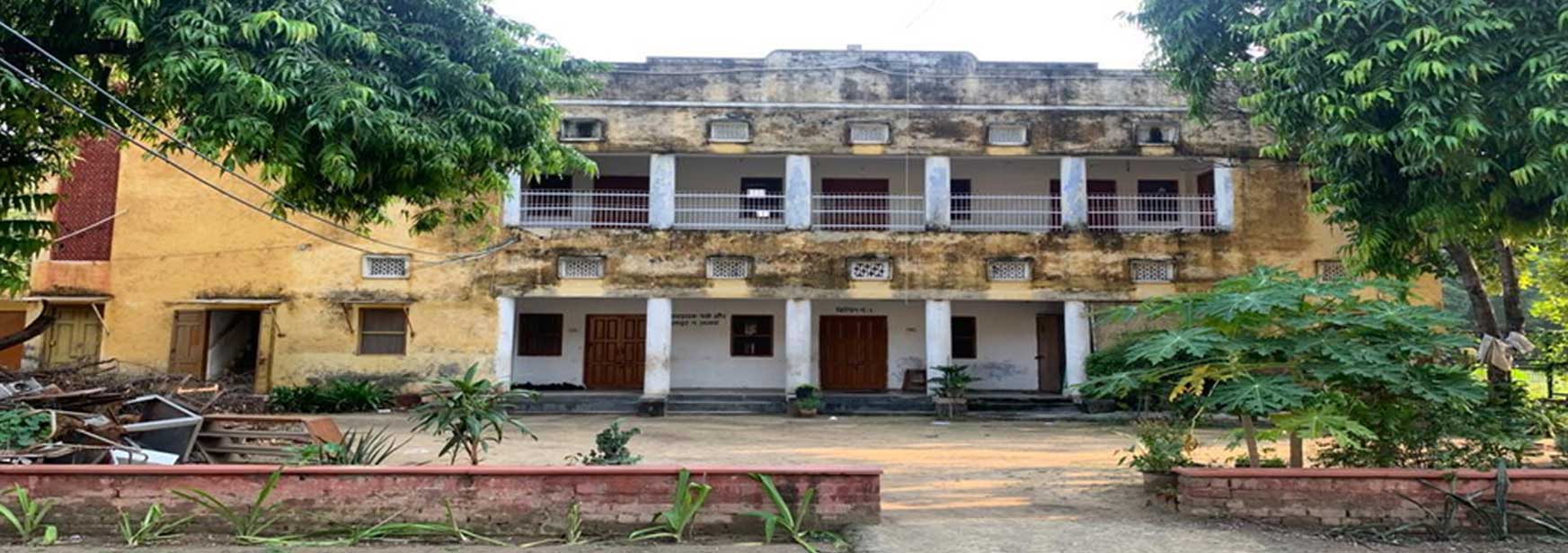
The Thakkar Bapa Hostel was established along with the school for accommodating scheduled caste students. Initially the scavengers used to leave their children inside the ashram during the daytime while they carried out their work. The hostel serves as a Sanskar Kendra, or a center for moral and cultural education, for the children. Throughout the year, the children celebrate various festivals like Janmashtami, Children’s day, Diwali, etc. These celebrations serve as a unifying force transcending caste, creed, and color.
THAKKAR BAPA LIBRARY
The Hostel boasts a library that has been financially and literally contributed by Koreans who visit the Thakkar Bapa Residential Primary School and Hostel annually. This interaction of thoughts between Korean and Indian culture, language, and more, fosters a valuable cultural exchange. The library offers a wealth of knowledge across various domains, fostering the intellectual development of students.
The hostel library offers a wide range of books covering various genres like science, space, history, geography, spirituality, fiction, illustrated short stories, fantasy novels, fairy tales, and flora and fauna.
There are religious texts like Geeta and books of Shiva, Chinmayanantha, Swami Ramatirtha, Sri Hanuman Leela as well as Ganesha. The collection also features short stories, including the famous Tenali Raman. For those who enjoy novels, there are works like Sherlock Holmes, Adventures of Robinson Crusoe etc. The library also houses books on Indian leaders like Gandhi and Nehru, as well as books on Indian monuments.
Charkha and Takli: Our students are taught the art of Charkha and Takli. During the Sadbhawana Diwas day program of HSS, the students spin yarn on every occasion and display their skills before all dignitaries. Students also participated in prathana held at Rajghat, Gandhi Samadhi, Gandhi Smriti and Darshan Samiti, Delhi on 2nd Oct. 2022 and 30th January. Students of Bapa Ashram engage in daily recitations of Bhajans that reflect Gandhian philosophy. To foster a spirit of healthy competition and creativity, various competitions, including painting, speech, and spelling contests are conducted.
MANAGEMENT
Dr.Nisha Bala Tyagi, after superannuation from Miranda House, Delhi University, is the Honorary Manager of Thakkar Bapa Residential Primary School and Hostel since November 2022. Former Deputy Proctor and Deputy Dean Academic, Delhi University, she was in-charge of Academic Activities (on deputation) at Gandhi Bhawan, Delhi University. She has done her Doctoral and Postdoctoral Research in Gandhi and Tolstoy from Delhi University.
Nisha has also published a book entitled “Goodness: the Gandhian way of life” ,a Gandhi Peace Foundation publication ,and has published several research papers and book reviews.
Nisha is the recipient of ‘Lifetime Achievement award in Philosophy’, 2017 , by VIFA 2017 and was felicitated by Miranda House as the ‘Illustrious Alumna’ on the Platinum Jubilee Celebration, 2024.
To spread the message of Mahatma Gandhi, she has delivered lectures and presented papers at the national and international level .Her invited lectures and paper presentations abroad include visits to Gandhi Foundation, (U.K.),Erlangen-Nuremberg University(Germany), Sweden ,Memphis (USA) and Virginia (USA). She also signed a manifesto against conscription and the military system at Berlin.Most of her visits were funded by the University Grant Commission.
Contact Details: Manager: Dr. Nisha Bala Tyagi, +919599415057
Email: drnishatyagi@hotmail.com
Warden: Santana Shukla: +919142725235
4. MAHADEV DESAI LIBRARY
“A library is an indication of education” – Mahatma Gandhi
Reading sheds light to the world of darkness. Books provide wisdom and drive away ignorance. Libraries stand as monuments to human knowledge and serve as vibrant centres of learning and culture. From ancient scrolls to modern e-books, libraries have evolved over the ages, adapting to the changing needs of society. In an era dominated by technology, the role of libraries might seem diminished, but their importance remains undiminished.
Considering the importance of reading in daily life, Harijan Sevak Sangh took an initiative to provide a space for reading around 1934. Eventually, with the contribution of renowned personalities, the reading room evolved into a library. On Tuesday, 24 September 2019, Shri Ramnath Kovind, the then President of India in the presence of Shri Morari Bapu, Shri. Prahlad Singh Patel (Former Minister of State for Tourism and Culture) and Dr Sankar Kumar Sanyal, President, Harijan Sevak Sangh inaugurated the Mahadev Desai Library cum Mahatma Gandhi Interpretation Centre.
The Mahadev Desai Library of Harijan Sevak Sangh, stands as a testament to the enduring spirit of social justice and the commitment to uplifting marginalized communities. Named after Mahadev Desai, a devoted associate of Mahatma Gandhi and a prominent freedom fighter, the library serves as a repository of knowledge, a symbol of empowerment, and a living tribute to the ideals of the Harijan Sevak Sangh. They preserve the wisdom of the past, making it accessible to present and future generations. The library named after him is a homage to his legacy and the organization’s dedication to his ideals.
Celebrating the linguistic diversity of India, Mahadev Desai library presents a wide arena of books in Sanskrit, Urdu, Gujarati, Tamil, Bengali, Marathi, Hindi and English. Considering the secular aspect of India, the library preserves the Holy books of Hinduism, Christianity, Islam, Buddhism and Jainism. Mahatma Gandhi’s principles of nonviolence, social justice, and self-reliance are fundamental to the Harijan Sevak Sangh’s mission. The Mahadev Desai Library plays a crucial role in preserving and disseminating these Gandhian values. Its collection includes Gandhi’s writings, speeches, and works of other prominent leaders of the freedom movement, allowing readers to gain insight into the philosophies that shaped the nation’s history.
The library houses a collection of top-notch books such as a hundred volumes of Collected Works of Mahatma Gandhi, journals like Harijan Seva, Maitri etc.
Despite the prevalence of technology, not everyone has equal access to digital resources. Our Library bridges this gap by offering computers, projector, three kiosk machines, LED TVs and internet access. Fully furnished Air-Conditioned rooms with proper seating arrangement gives the better ambience for aspirants to study for long hours.
Interpretation Centre: Library has the interpretation centre in which there are three Kiosk Machines available, each Kiosk provides information about HSS and about Gandhiji in the form of a quiz, photo gallery, short movie etc. Rare books on Gandhiji, many freedom fighters, Lok sabha debates, Harijan Sevak Sangh journal and documentary about Gandhiji are also available. It provides a projector facility through which we can present a program or presentation at a large level.
The list of eminent personalities who have visited Mahadev Desai Library are Shri Ramnath Kovind, President of India, Bharat Ratna Shri Pranab Mukherjee, Former President of India, Shri. M.Venkaiah Naidu, Vice President of India, Rev. Dalai Lama, Nobel Laureate, Tibetan spiritual leader, Shri Pujya Murari Bapu, Ramkatha Exponent, Smt. Tara Gandhi Bhattacharya, Granddaughter of Mahatma Gandhi, Smt. Anandi Ben Patel, Governor of Uttar Pradesh and Former Governor Madhya Pradesh, Shri Arif Mohammad Khan, Governor of Kerala, Smt. Sonia Gandhi, Chairperson, UPA, Former Leader of Opposition of Lok Sabha, Major General Jiban Kanai Das (Retd), Gandhi Ashram Trust, Noakhali, Bangladesh, Shri Prahlad Singh Patel, Minister of Tourism & Culture, Govt. of India, Shri Gajendra Singh Shekhavat, Minister of Jal Shakthi, Govt. of India, Shri Rama Sankar Bajoria and many other eminent personalities.
Libraries inspire the pursuit of knowledge, nurture creativity, and uphold the values of inclusivity and cultural heritage. As we move forward in the digital age, it is crucial to recognize and preserve the timeless significance of libraries for the enrichment of society.
GANDHI STATUE
A statue of Mahatma Gandhi along with two poor children wherein one carries pigeon and another carries flower is placed in the front of Interpretation Centre which gives a positive and serene ambience. Besides addressing the philosophy of peace and harmony by symbolising it with pigeon and flowers respectively, the statute also shows the compassion, love, and affection of Mahatma Gandhi towards the world and especially on Dalits and the deprived. A tile containing with the name पृथ्वी पर शांति (transl. Peace on Earth) is placed beside the statute. It enumerates the importance of Peace and also explains that peace can be achieved only by uplifting harijans. Furthermore, it describes the importance of becoming a self reliant country by helping each other.
ENQUIRY
Contact: Sambhu Bhai: +919968010674
Timing: 8 AM – 8 PM (Monday – Saturday)
Monthly Fee – Rs 800/-
5. MAHATMA GANDHI YOGA CENTRE
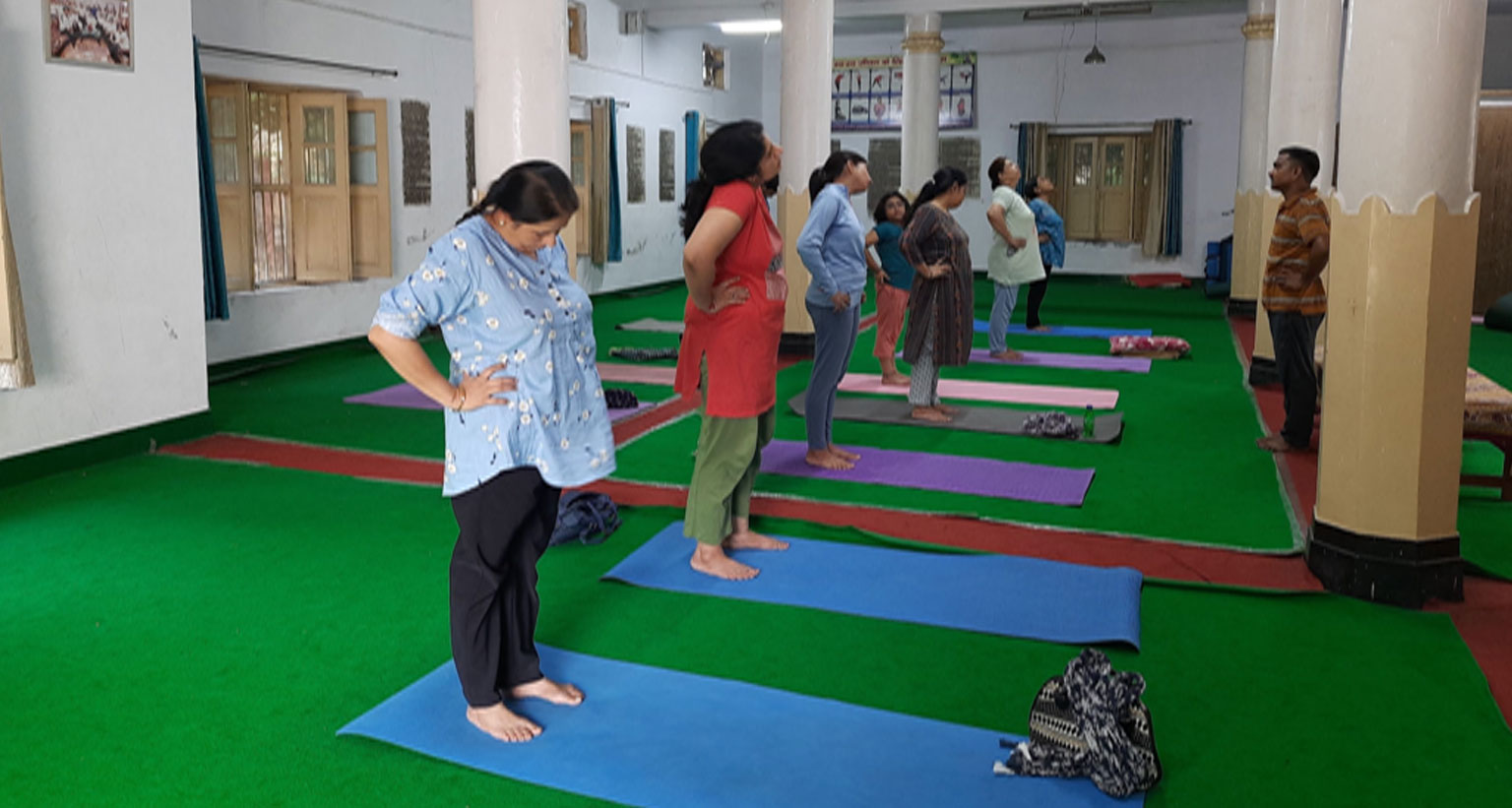
Mahatma Gandhi Yoga Centre started functioning in September 2011 with financial support of Morarji Desai National Institute of Yoga upholding the importance of maintaining mental and physical well-being. After a brief hiatus of three years the Centre resumed operations on November 25, 2017 by Shri M. Venkaiah Naidu, the Honourable Vice President of India. In addition to serving as a yoga training facility, the centre also provides patients with yoga treatment. The Pandemic shutdown forced the closure of this centre as well. However, the centre continued to offer online yoga classes with financial assistance from the Indian government’s Morarji Desai National Institute of Yoga.
Contact: Ms. Nalini Khurana: +917290800032 and Ms. Prabadh Yadav
7 am – 8 am, 8 am -9 am, 5 pm – 6 pm
6. MATA KASTURBA GIRLS HOSTEL
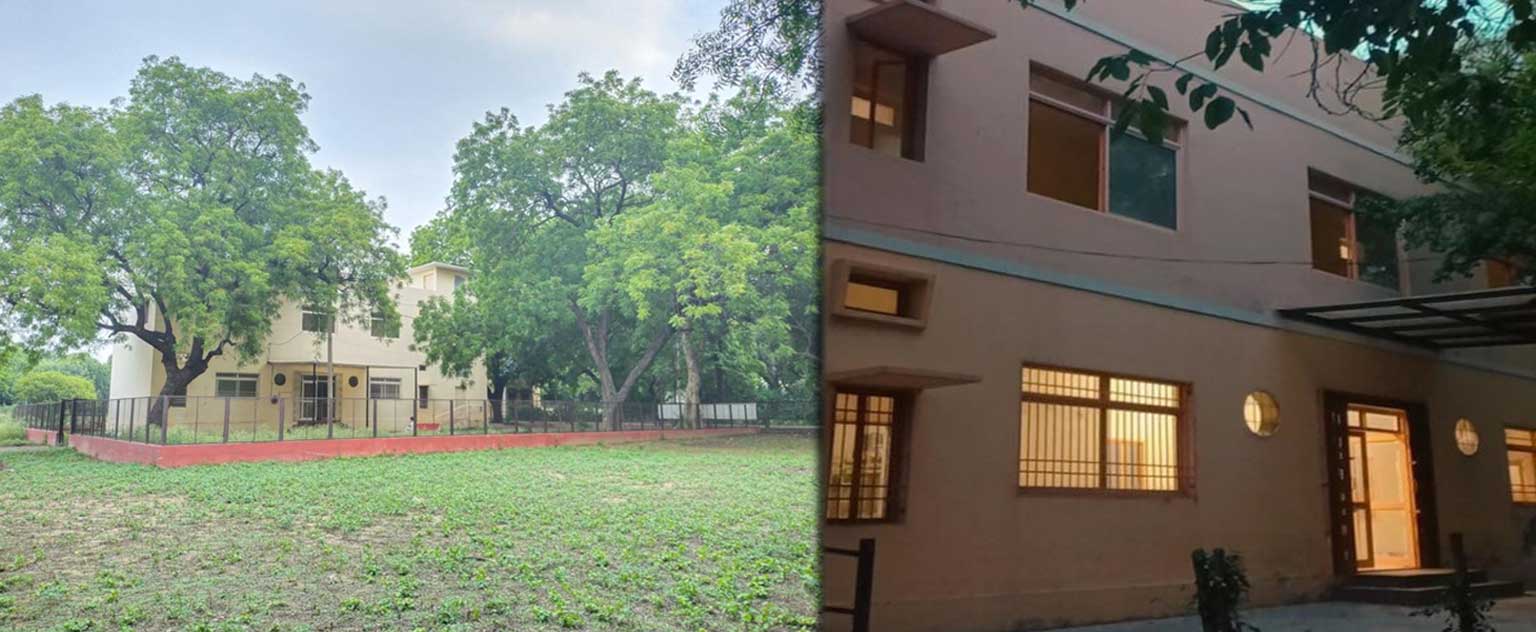
The establishment of Mata Kasturba Girls hostel took place on July 19, 1999, with the enrolment of 16 girls hailing from the north eastern region of India. Over the years, the institution has grown significantly, and by 2011, we had a total of 72 girls from the same region. The hostel comprises two buildings, with Building I housing eight rooms and Building II housing six rooms.
This hostel is totally run by the financial support of the Sangh and no grants are received from any quarters for its implementation. Harijan Sevak Sangh takes only usage charges and the mess is managed by the girls themselves. For the past two decades, we had provided a mess facility. However, as of 2019, the mess facility is no longer available. Currently, our seats are occupied by undergraduate and postgraduate students mainly from University of Delhi. Around twenty percent of our seats are reserved exclusively for students from the Tech Mahindra Institute, which is located within our campus.
Before the COVID-19 pandemic, our institution was home for 108 individuals. Throughout the pandemic the hostel remained shut due to lockdown and safety reasons. We celebrate various events and festivals within our hostel, including the Annual Day, Bihu Festival, Diwali, Janmashtami, and many more.
It is our utmost pleasure to inform you that various inmates of the hostel who have completed their education are currently leading a successful life in their career. In order to get admission in the hostel, students should submit an application along with the college identity card to the Hostel Warden. Ms. Rosamma Joby is taking care of the two hostels.
Contact: Chief Warden- Rosamma Joby: 9958739157
7. PRAKRITIK JEEVAN CHIKITSA KENDRA
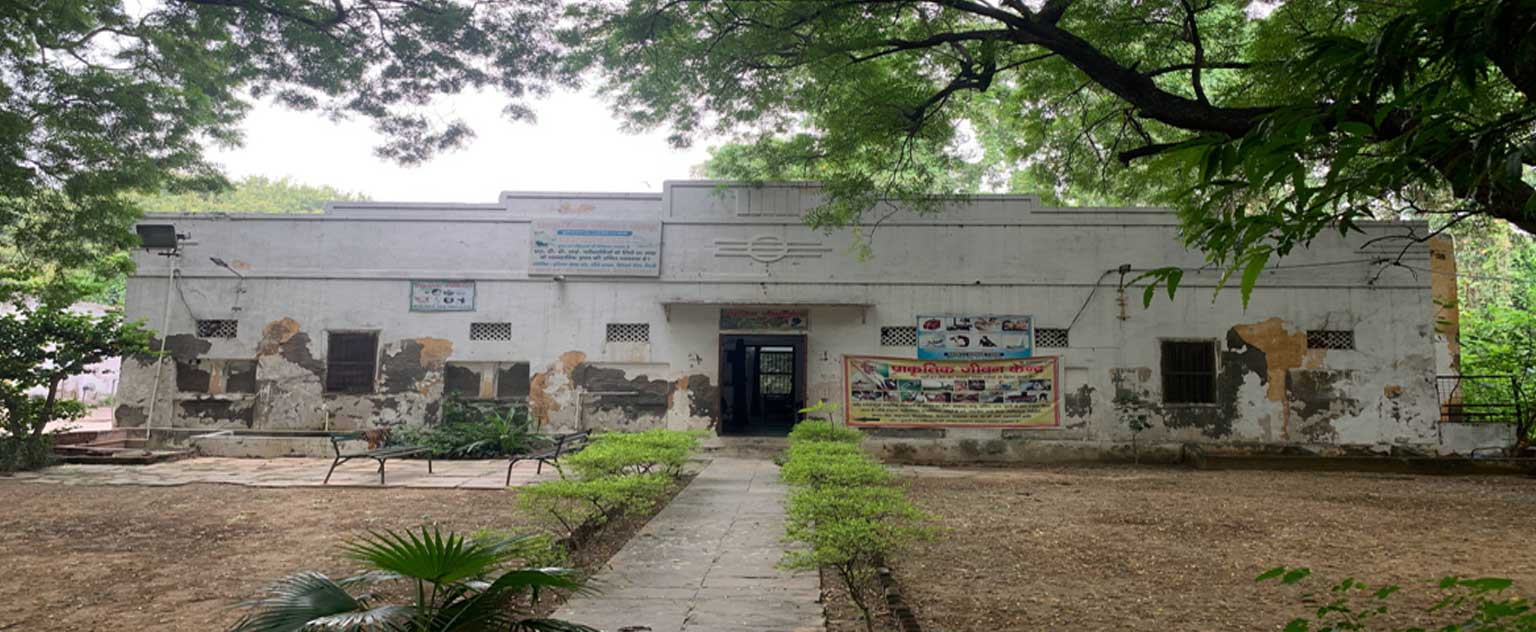
In order to recommend and promote the practice of Prakritik Chikitsa (known as Naturopathy) as envisaged by Mahatma Gandhi, the Prakritik Jeevan Kendra, was established at the premises of Harijan Seva Sangh to act as a Naturopathy O.P.D. (Outpatient Department) as he was an avid follower of it.
Though, the Centre was reopened to the public in 2011, it offers exceptional and worthier treatment for a wide range of diseases / disorders such as obesity, arthritis, joint pain, migraine, blood pressure, cervical, skin diseases, constipation, gas, thyroid, slipped disc, depression, sinus, asthma and all stomach problems. It treated 118 patients in the year 2021-22. The centre treats patients particularly with 100% natural punch elements. Additionally, the centre conducts a diploma course on Naturopathy, a three year course on Yoga (N.D.D.Y) and an internship for a period of six months.
Work Timings: All days except Monday from 07:30 AM to 03:00 PM Holiday: Monday
Contact: Dr. Rajesh Raj: +919350667211 / Preeti Dixit: +918077575380
Charge: 100-500 Rs (Depends on treatment)
8. TOILET MUSEUM
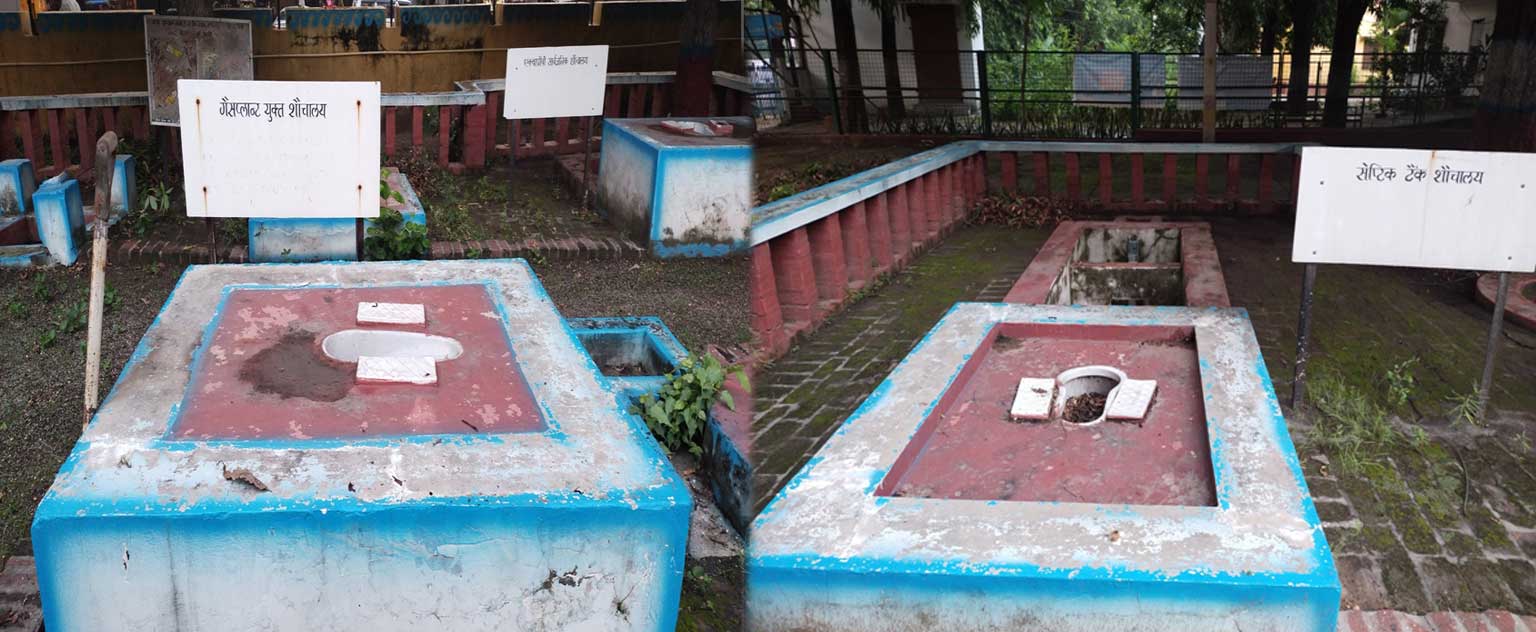
Toilet museums was established in 1961 which is the exhibition of low cost toilets based on idea of Padmashree Ishwarbhai Patel, “Toilet Man of India”, who build over 2,00,000 toilets across the riverine bank through the ‘Safai Vidyalaya’ initiative at the Gandhi Ashram and helped launch 118 organisations to work in elevating the sanitation standards across the country with the aim to make it accessible to even the poorest of Indians likeGas Plant Yukth Shauchalay, Ekvapri Sarvajanik Shauchalay, Septic tank shauchalay,
